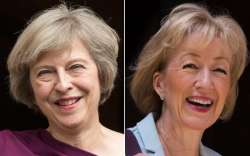Britain to get second female PM: Theresa May, Andrea Leadsom in Conservative runoff
London: Conservative lawmakers chose Home Secretary Theresa May and Energy Minister Andrea Leadsom on Thursday to fight a runoff contest for leadership of Britain’s governing party. The winner will become the country’s second female prime

London: Conservative lawmakers chose Home Secretary Theresa May and Energy Minister Andrea Leadsom on Thursday to fight a runoff contest for leadership of Britain’s governing party. The winner will become the country’s second female prime minister.
May received 199 votes in a ballot of Conservative members of Parliament, while Leadsom received 84. Justice Secretary Michael Gove got 46 votes and was eliminated from the race.
Some 150,000 Conservative Party members will now vote by postal ballot, with the result announced Sept. 9.
The winner will replace Prime Minister David Cameron, who announced his resignation after Britain voted last month to leave the European Union.
Britain’s first female prime minister was Margaret Thatcher, a Conservative who governed from 1979 to 1990.
The new leader will be responsible for leading Britain’s exit negotiations with the 28-nation EU as well as helping to steady the country’s government and economy, which has been deeply shaken by markets’ reaction to the EU vote.
The result of the ballot is a slap in the face for Gove, whose ambition to lead the country lasted only a week. He campaigned for an EU exit alongside popular former London Mayor Boris Johnson, who had been expected to seek the party leadership, with Gove as his campaign manager.
But Gove shocked the party by announcing last week that he had decided Johnson was not up to the job and declaring himself a candidate instead. The betrayal probably hurt his leadership chances, fueling a view among Tories that he is disloyal.
Leadsom, 53, who also backed the “leave” campaign in the referendum, says the prime minister should be someone who truly believes in a British exit, or Brexit.
May, 59, supported the losing “remain” side in the EU vote but says she is the best person to unite a party that – like the country – is divided over the referendum result.
She said she was delighted to have won support from “leavers and remainers, MPs from the length and breadth of the country.”
“This vote shows that the Conservative Party can come together – and under my leadership it will,” she said.
May has drawn criticism for failing to guarantee that citizens of EU countries who live in Britain will be able to remain after Brexit. That has led to accusations she is using European citizens as pawns in the EU divorce talks.
In a speech to supporters Thursday, Leadsom promised that Britain could retain free trade with the EU while simultaneously controlling immigration – an unrealistic prospect, according to critics.
“I will not use people’s lives as bargaining chips in some negotiation,” Leadsom promised.
“People need certainty and they will get it,” she said. “I say to all who are legally here that you will be welcome to stay.”
Leadsom, who entered Parliament in 2010 after a career in financial services, has less political experience than May, and has faced allegations from rivals that she exaggerated her experience in the financial sector.
May, Britain’s interior minister for the past six years, is the runaway favorite among lawmakers – but the Conservatives have a history of not choosing the favorite.
Leadsom’s plainspoken, common-sense style and strong opposition to the European Union have made her popular with the party’s grassroots membership, which is older and more euroskeptic than the British average.